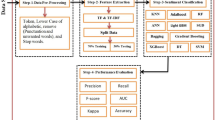Abstract
The information in customer reviews is of great interest to both companies and consumers. This information is usually presented as non-structured free-text so that automatically extracting and rating user opinions about a product is a challenging task. Moreover, this opinion highly depends on the product features on which the user judgments and impressions are expressed. Following this idea, our goal is to predict the overall rating of a product review based on the user opinion about the different product features that are evaluated in the review. To this end, the system first identifies the features that are relevant to consumers when evaluating a certain type of product, as well as the relative importance or salience of such features. The system then extracts from the review the user opinions about the different product features and quantifies such opinions. The salience of the different product features and the values that quantify the user opinions about them are used to construct a Vector of Feature Intensities which represents the review and will be the input to a machine learning model that classifies the review into different rating categories. Our method is evaluated over 1000 hotel reviews from booking.com. The results compare favorably with those achieved by other systems addressing similar evaluations.
Access this chapter
Tax calculation will be finalised at checkout
Purchases are for personal use only
Preview
Unable to display preview. Download preview PDF.
Similar content being viewed by others
References
Wiebe, J.M., Bruce, R.F., O’Hara, T.P.: Development and use of a gold-standard data set for subjectivity classification. In: Proc. of ACL, pp. 246–253 (1999)
Pang, B., Lee, L.: A sentimental education: Sentiment analysis using subjectivity summarization based on minimum cuts. In: Proc. of ACL, pp. 271–278 (2004)
Kim, S.M., Hovy, E.: Determining the sentiment of opinions. In: Proc. of COLING, pp. 1367–1373 (2004)
Pang, B., Lee, L., Vaithyanathan, S.: Thumbs up? Sentiment classification using Machine Learning techniques. In: Proc. of CoRR (2002)
Turney, P.D.: Thumbs up or thumbs down?: Semantic orientation applied to unsupervised classification of reviews. In: Proc. of ACL, pp. 417–424 (2002)
Esuli, A., Sebastiani, F.: Determining term subjectivity and term orientation for opinion mining. In: Proc. of EACL, pp. 193–200 (2006)
Brooke, J.: A semantic approach to automated text sentiment analysis. PhD thesis, Simon Fraser University (2009)
Wilson, T., Wiebe, J., Hoffmann, P.: Recognizing contextual polarity: an exploration of features for phrase-level sentiment analysis. Computational Linguistics 35(3) (2009)
Carrillo de Albornoz, J., Plaza, L., Gervás, P.: A hybrid approach to emotional sentence polarity and intensity classification. In: Proc. of 14th CoNLL, pp. 153–161 (2010)
Martineau, J., Finin, T.: Delta TF-IDF: An improved feature space for sentiment analysis. In: Proc. of 3rd AAAI Conference on Weblogs and Social Media (2009)
Carenini, G., Ng, R.T., Pauls, A.: Multi-document summarization of evaluative text. In: Proc. of EACL (2006)
Titov, I., McDonald, R.: A joint model of text and aspect ratings for sentiment summarization. In: Proc. of ACL/HLT, pp. 308–316 (2008)
Kim, S.M., Hovy, E.: Automatic identification of pro and con reasons in online reviews. In: Proc. of COLING/ACL, pp. 483–490 (2006)
Hu, M., Liu, B.: Mining opinion features in customer reviews. In: Proc. of AAAI (2004)
Plaza, L., Díaz, A., Gervás, P.: Automatic summarization of news using wordnet concept graphs. IADIS International Journal on Computer Science and Information System V, 45–57 (2010)
Lesk, M.E.: Automatic sense disambiguation using machine readable dictionaries: How to tell a pine cone from a ice cream cone. In: Proc. of SIGDOC (1986)
Yoo, I., Hu, X., Song, I.Y.: A coherent graph-based semantic clustering and summarization approach for biomedical literature and a new summarization evaluation method. BMC Bioinformatics 8(9) (2007)
Jiang, J.J., Conrath, D.W.: Semantic similarity based on corpus statistics and lexical taxonomy. In: Proc. of International Conference Research on Computational Linguistics (1997)
Lin, D.: An information-theoretic definition of similarity. In: Proc. of ICML, pp. 296–304 (1998)
Author information
Authors and Affiliations
Editor information
Editors and Affiliations
Rights and permissions
Copyright information
© 2011 Springer-Verlag Berlin Heidelberg
About this paper
Cite this paper
de Albornoz, J.C., Plaza, L., Gervás, P., Díaz, A. (2011). A Joint Model of Feature Mining and Sentiment Analysis for Product Review Rating. In: Clough, P., et al. Advances in Information Retrieval. ECIR 2011. Lecture Notes in Computer Science, vol 6611. Springer, Berlin, Heidelberg. https://doi.org/10.1007/978-3-642-20161-5_8
Download citation
DOI: https://doi.org/10.1007/978-3-642-20161-5_8
Publisher Name: Springer, Berlin, Heidelberg
Print ISBN: 978-3-642-20160-8
Online ISBN: 978-3-642-20161-5
eBook Packages: Computer ScienceComputer Science (R0)




